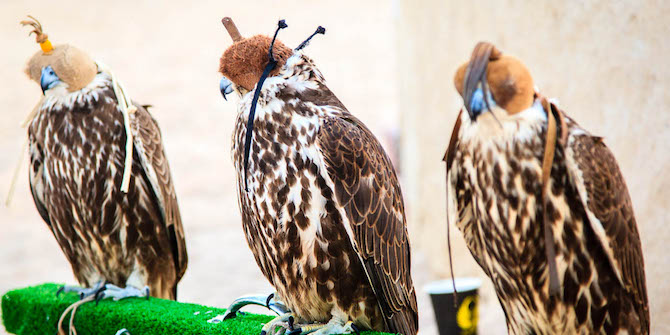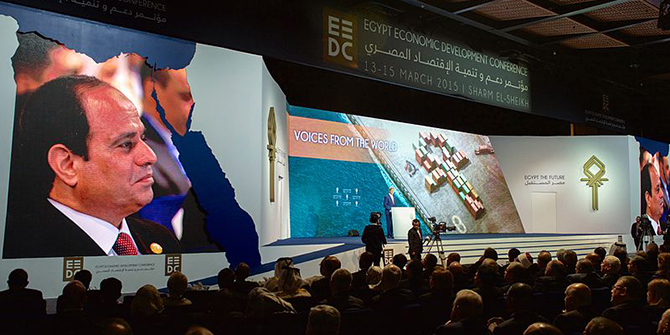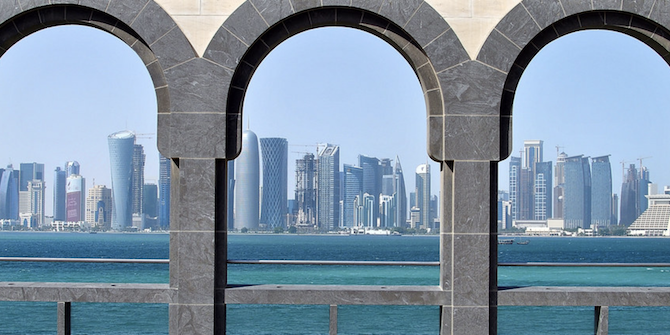by Natalie Koch
This memo was presented part of a workshop organised by the LSE Middle East Centre on 13 June 2018, looking at Tribe and State in the Middle East.

Falconry is an important nationalist symbol in many countries, but perhaps nowhere does it figure so prominently in identity narratives as in the Gulf Arab states. Part of a broader romanticization of the Arabian Peninsula’s Bedouin past, images of falcons and falconry have become key icons in nationalist imagery. But more than just a symbol, falconry is also a sport actively practiced by many Gulf nationals. Yet as it is practiced today, and as a kitschy nationalist icon, falconry exemplifies how nationalism operates through a set of “invented traditions,” which Eric Hobsbawm famously described in writing on the French Republic’s production of national identity in the late 1800s. Hobsbawm’s argument is not that state-scale actors conjure traditions and practices out of thin air, but that they selectively work with pre-existing norms, activities, aesthetics, and other cultural practices to develop a mainstream narrative about what it means to be quintessentially “French” or, as I discuss here, “Qatari” or “Emirati.”
Across the Gulf states, falconry is described as a “heritage sport.” But in contrast to their Bedouin ancestors, today’s falconers in the Arabian Peninsula understand it as a distinctly elite sport. Like fox-hunting, equestrian sport, or even yachting or elite car-racing, only the crème-de-la-crème can afford their own birds (some costing upwards of US $80,000) or to travel for hunting excursions abroad (bans and local extinction of the favoured prey, the houbara bustard, prohibit hunting at home). Just as fashionistas or owners of expensive cars seek to show off their luxury items, falconers in the Gulf can often be seen in public with their luxury birds. As important as the financial angle is to the story of falconry in the region, I have argued that it is productively analysed through the lens of geopolitics. As an invented tradition that figures centrally in narratives about Gulf nationalism, references to falconry help to reproduce territorial imaginaries and spatial hierarchies, naturalizing a geopolitical order defined by the state system and citizens who ‘belong’ in some places but not others.
Falconry has become a prominent theme in nationalist celebrations and other iconic representations of Gulf identity, but state actors have also been advancing nationalist pride through locally promoting globalized elite sports, such as Formula One racing in Abu Dhabi and Bahrain, as well as Qatar’s plan to host the FIFA World Cup in 2022. The region-wide promotion of elite sport has rapidly become an important dimension of the Gulf states’ nationalist discourses, which aim to develop a modern, “cosmopolitan” image of the countries for international consumption.
The nationalist effort to conjure an image of Gulf states as cosmopolitan through promoting global sport differs significantly from the nationalist discourses that circulate around falconry. This is because falconry uniquely symbolizes Gulf nationals’ Bedouin heritage – serving as a homeland narrative that hearkens back to an imagined primordial Arab way of life. As the Gulf states have undergone rapid social and economic change and increasingly engaged with globalized cultural institutions, such as sport, a persistent nationalist anxiety of local cultural loss lingers among some Gulf nationals. Many citizens openly embrace the demographic diversity of their countries and see the globalization of their societies as the way of the future. Yet these same individuals, as well as others who instead perceive “globalization” as an imperial iteration of “Westernization,” also consistently look to the past and valorise cultural preservation: this is the famous Janus-faced character of nationalism.
Visuals and cultural activities surrounding falconry often come across as apolitical or merely kitschy expressions of nationalism. Yet they are deeply political. When held up as an icon of nationalist heritage, falconry exemplifies how contemporary anxieties are narrated about Arab culture under threat from globalization in the Arabian Peninsula. “Heritage” is an increasingly common catchphrase in the Gulf. It both taps into the international legitimacy accorded to preserving cultural sites and practices, but it also indexes ethnic nationalist identity in the Gulf. Across the region, this has manifested in rapidly-proliferating “heritage villages”, national museums, ubiquitous displays of dhow boats associated with the region’s old pearling economy, as well as the promotion of other invented sporting traditions like camel racing. Recent efforts to promote falconry have been part of this trend, seen most intensely in the United Arab Emirates. The UAE led the initiative to have falconry recognized by UNESCO, under its Intangible Cultural Heritage of Humanity Program, and the country hosts a range of other projects, like the International Falconry Festival, the much-touted Abu Dhabi Falcon Hospital, and its related captive-breeding programs and the Sheikh Zayed Falcon Release Program.
As welcome as local conservation projects may be, it is important to note that falconry in the Gulf is thoroughly ethnicized. Sometimes termed “Arab falconry,” it is locally understood to be an undertaking for Gulf nationals alone. This is especially significant in countries like the UAE and Qatar, where citizens represent only about 10 percent of the total populations, and the remaining 90 percent are non-citizens with effectively no hope of naturalization. Nationalist iconography related to falconry subtly privileges Gulf nationals and debar the belonging of the foreign residents who far outnumber citizens across the region. That is, the idea of falconry as a “heritage” sport normalizes the idea that only Gulf citizens are truly “at home” on the Arabian Peninsula, as opposed to everyone else in the region who cannot claim falconry as “their” heritage. The practice of falconry in the Gulf of course draws on real histories and cultural traditions in the region. But when promoted by states like the UAE, it operates as an invented tradition that quietly legitimates the central claim of their strict jus sanguinis citizenship regimes: that the Arabian Peninsula is the exclusive homeland of Gulf nationals alone – that this is rightfully their land. Reaffirming the minority citizen-nationals’ claims to “ownership” of the state, falconry promotion efforts reinforce contemporary territorial regimes and narrate nationalist – not cosmopolitan – claims to who truly “belongs” in the Arabian Peninsula.
Similarly, falconry is distinctly gendered. The sport is coded as male, not just through visual depictions of its practitioners as a kind of “fraternity”, but also through their exclusion from hunting expeditions. Falconry is intimately connected to the experience of the desert camp, where men come together for socializing, making political deals and otherwise deepening their bonds. The camp is a common metaphor for Gulf tribal relations, but as with the silent erasure of expats just noted, the imagery surrounding Arab falconry naturalizes it as a male space and silently excludes women. To the extent that the valorisation of falconry as a Gulf heritage sport perpetuates patriarchal structures and cultures of masculinity, it is not an “innocent” pastime. As an invented tradition, it is a marker of masculinist Gulf ethno-national identity and affinity with their homeland – but in their quiet absence, women are clearly less at home in this homeland.
Lastly, falconry as an invented tradition plays an important role in how the wealthiest Gulf citizens develop transnational connections and move beyond their borders for hunting expeditions. Traditionally, Gulf elites have travelled to Pakistan and other countries in North Africa for their expeditions. Due to tightened legal frameworks and local outrage in some of these countries, permitting has become much harder and Gulf elites are increasingly traveling to the post-Soviet states of Central Asia. Much of this activity is illicit and goes undocumented, as I have seen in Turkmenistan, but it sometimes operates through more official channels. As early as February 2007, for example, Qatar signed a cooperation agreement on the protection of Kazakhstan’s houbara bustard population, which opened the door for Qatari falconers to hunt in the wild there. Kazakhstan has since become one of Sheikh Tamim’s favourite destinations (at least until a mishap in September 2016 when two of the Sheikh’s prized falcons died from overexposure in the Almaty airport customs control).
Indeed, Central Asia’s appeal for Gulf elites has largely rested with its role as a venue for falconry – not just because of its accessible permitting process, but also for its comparative political security. This was a message that especially hit home after 27 Qatari hunters and royal family members were abducted in Iraq in December 2015. The government’s effort to secure their release in April 2017 is said to have entailed a US $1 billion ransom payment to Iranian-backed militias and other Islamist terror groups, which some commentators suspect was the “straw that broke the camel’s back” leading to the regional blockade of Qatar (led by Saudi Arabia and UAE, and joined by Bahrain, Egypt, Libya, and the Maldives), which severed diplomatic ties and cut off Qatar’s vital air, sea, and land connections on 5 June 2017 (the Financial Times reported on the connection between the hostage deal to free the Qatari hunting party a few days later, but the story has only recently garnered international attention since the more recent reporting in the New York Times Magazine and Washington Post). The falconers have since been released, but the blockade of Qatar is far from over.
Far from a sideshow to the main affairs of foreign policy, falconry is a major interest for Gulf elites – and an invented tradition with significant consequences from the most silent structural exclusions to the most explosive diplomatic spats.
Natalie Koch is Associate Professor in the Department of Geography at Syracuse University, where she specialises in nationalism, geopolitics, and authoritarianism in post-Soviet Central Asia and the Arabian Peninsula. She is the author of The Geopolitics of Spectacle: Space, Synecdoche, and the New Capitals of Asia and editor of Critical Geographies of Sport: Space, Power, and Sport in Global Perspective.
Other posts in this Series:
- Introduction by Courtney Freer
- Tribalism in Middle Eastern States: A Twenty-first Century Anachronism? by Richard Tapper
- Tribe and State in the Contemporary Arabian Peninsula by J. E. Peterson
- The Syrian Civil War: What Role do Tribal Loyalties Play? by Haian Dukhan
- Tribes and Tribalism in a Neoliberal Jordan by Jessica Watkins
- From Revolutions to Elections: When Tribes Transform State Power by Alice Wilson
- The Political Decline and Social Rise of Tribal Identity in the GCC by Steffen Hertog
- On Tribalism and Arabia by Andrew Gardner
- Tribal Modern: Branding New Nations in the Gulf by miriam cooke
- Tribal Social Evolution and Gender: Conflict in Urbanized Tribal Units by Alanoud Alsharekh
- Tribal Revival in the Gulf: A Trojan Horse or a Threat to National Identities? by Maryam Al-Kuwari







It’s great information and want to add more information for tourists and residents of Abu Dhabi. If you are a pet lover and you live in Abu Dhabi and wants cleaning and grooming service for your pets. Then I recommend Nin9Tails because it’s one of the best organizations for mobile pet grooming in Abu Dhabi. I have had a great experience with this organization. https://www.nin9tails.com/